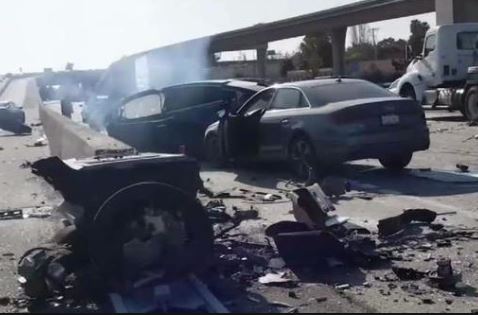
Tesla Model X crash, Hwy 101 Mountainview, California
The family of a driver killed in the crash of a Tesla Model X driving on Autopilot filed a lawsuit April 26 against Tesla over the crash, Bloomberg reported.
Software engineer Walter Huang, 38, was killed March 23, 2018, when his 2017 Model X drifted out of the left lane of Highway 101 in Mountain View, California and struck a concrete median divider.
The NTSB investigated the crash and issued a preliminary report June 7 and noted that Huang had the car's Autopilot system engaged and set to a cruise speed of 75 mph on the highway. The report showed that Huang had his hands off the steering wheel for the last six seconds prior to the crash and had held the wheel for 34 of the 60 seconds prior to the crash. The system gave Huang three warnings in the 15 minutes prior to the crash.
READ THIS: Investigators: Autopilot sped up before fatal Tesla Model X crash
According to the report, the car slowed down to 65 mph behind a lead vehicle and steered left toward the barrier, disengaged from following the lead vehicle and accelerated (toward its preset 75 mph) before it struck the barrier. The crash attenuator at the end of the barrier was previously damaged by another accident a week earlier.
The lawsuit also names the state of California as a defendant for not repairing the crash attenuator before Huang hit the barrier.
The lawsuit alleges that Tesla knew or should have known that the car could leave travel lanes and strike fixed objects, likely causing injury to its occupants "when used in a reasonably foreseeable manner."
It says that Tesla should have recalled the cars or provided a warning in light of this risk.
CHECK OUT: Report: Tesla kicked out from official investigation over fatal Model X crash
In response to the initial crash, Tesla issued a statement and said, "Tesla is extremely clear that Autopilot requires the driver to be alert and have hands on the wheel. This reminder is made every single time Autopilot is engaged."
In a statement announcing the lawsuit, the family's lawyer, B. Mark Fong accused Tesla of "beta testing its Autopilot software on live drivers.
"The Huang family wants to help prevent this tragedy from happening to other drivers using Tesla vehicles or any semi-autonomous vehicles," Fong said.
Tesla has since released extensive updates to its Autopilot system, expanding its capabilities, installing a more capable processor chip, and rebranded its self-driving as Full Self-Driving Capability. Last month, the company detailed the system's updated capabilities and features, and announced that by the end of this year it expects the system to be "feature complete" for self-driving, although self-driving cars aren't yet allowed by law.